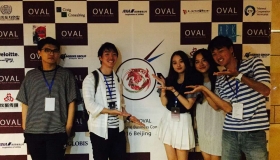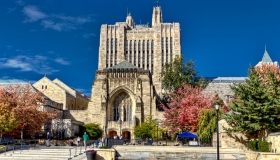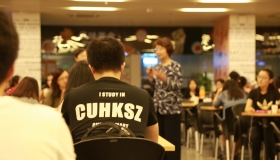Warshel’s at The Chinese University of Hong Kong

It is my honor and pleasure to be here today addressing the new wave of world leaders. You, sitting before me, are the future of innovation and discovery.
It is okay if you do not yet know how, or in what area, you will make a difference in the world. Right before I went to college, as I was finishing my time in the Israeli army, I asked my friend Eliezer what I should study.
He said chemistry.
I asked, “Why?”
And he said, “Because you have good vision.”
At the time, he meant vision in the simplest meaning of the word — that because he wore glasses and I did not, that I must see well. Chemists, he thought, should have sharp eyesight. However, throughout my life, that conversation has taken on a greater meaning.
To be a chemist, it matters much more whether you are visionary than whether you can see letters on an eye chart. I believe this goes for every discipline that requires problem-solving skills. You must have an ability and a desire to look beyond the visible and imagine what is possible. I was asked to speak to you because I am a Nobel laureate. So today I want to tell you more about my path to receiving that incredible honor and offer some advice on how you can position yourselves to succeed in the sciences — or any field in academia.
To give you some background, I grew up on a kibbutz in Israel. The first kibbutzim were founded in the early 1900s as socialized farming communities. They were established as contained societies dedicated to mutual aid and social justice. Everyone plays a role that contributes to the greater good of the community.
In fact, I spent much of my teenage years working in fishponds catching carp, which we later canned and sold. But there is a misconception I would like to debunk. Throughout the world, many people believe that because kibbutzniks live together harmoniously, we are not competitive. That could not be further from the truth.
From the time I was a young child, I felt compelled to compete with my classmates because we were always together. We ate together, studied together, worked together and played sports together. Naturally, we each wanted to stand out.
We studied hard to get the best grades. We trained hard to be the strongest and the fastest. The competition was certainly not vicious — after all my classmates were also my closest friends. But in our hearts, we each wanted to be the one whom people would point to in a group picture and say, “That one is going to change the world.”
Looking at all of you before me, I am confident that I could point to any one of you and say just that. Each one of you stands out with a unique brilliance. Each one of you has the potential to be a visionary.
One reason I was so enthusiastic about speaking here is because of your dedication to being a stellar research university with a strong commitment to improving our global society. After all, what is scholarship without application?
According to a 2014 Global R&D funding forecast published by Battelle, the world’s largest nonprofit research and development organization, China’s funding for scientific research will likely be the highest in the world within the next ten years.
Think about what that means for you! If you keep building on your skills and foundational knowledge, you will have everything you need to make a difference for humanity.
I want to tell you a story about when I was an undergraduate like you studying chemistry at the Technion, Israel’s Institute of Technology. I became extremely fascinated by enzymes, the biological catalysts, or change-makers in living systems. I knew that unlocking the chemistry of enzymes would open a new world of understanding for chemists, biologists and physicists.
Though I didn’t yet have the training or expertise to solve the mystery then, I developed a focus. And this excited me. In a physics class, I learned to step back and look at what happens very far from the collision of two particles to figure out what happens in the actual reaction.
I told a friend in the physics department that I was going to use this exact principle to unlock the magic of enzymatic reactions. Of course, the overall trajectory of my career was not this straightforward. But I do believe that because very early on I set a goal for myself, it kept me focused throughout my education.
The first piece of advice I will offer as you enter this next stage is to stay engaged in what you learn. Even if memorizing verb charts, anatomy or economic terms seems monotonous now, ask yourself, “What could understanding this lead to in the future?”
- The celebrated British poet William Blake wrote:
- “To see a World in a Grain of Sand
- And a Heaven in a Wild Flower,
- Hold Infinity in the palm of your hand
- And Eternity in an hour.”
For me, the enzyme was that grain of sand in which I saw a world of opportunity. My early studies focused on computer simulation of the action of biological molecules. And now, with my team at the University of Southern California in Los Angeles, we are building on decades of work to use these methods to push the boundaries of what molecular simulations can do. To offer a clearer picture, my work can be applied to issues such as drug resistance and cancer treatment.
Because disease-causing molecules, or pathogens, can change randomly, it is unclear to scientists what the next target for new pharmaceuticals will be. Through my work with computers, we are able to simulate drug resistance on a molecular level and create medications to which the pathogens will not easily adapt.
In addition, understanding enzymes can improve chemotherapy to fight cancer more effectively with much less painful side effects.
It took me decades to reach the point at which my computational research began to lead to real-world progress. But it was certainly worth the effort. I urge all of you to seek out problems that other people have said cannot be solved. They are the most challenging to tackle, but also the most rewarding.
This brings me to my second piece of advice to you: Always persevere. Don’t become discouraged and give up because something doesn’t come easily. In winning battles with yourself, and your self-doubt, you will gain invaluable strength and wisdom.
I remember in the early 1970s, when I worked at the Medical Research Council in Cambridge. All my colleagues spoke eloquently and intelligently about biological models, but for me nothing made sense. I didn’t have the internal vision to think of how I would connect my understanding of chemistry to biomedical research.
Regardless of how much reading I did, I couldn’t see it. But then suddenly, after about a year, it clicked. It was almost is if my brain reconfigured itself in that moment and the questions I needed to ask came to the surface.
Be patient and wait for those “aha-moments.” If you keep reading, and talking to your professors and fellow students and putting in the effort, the connections will come.
The third piece of advice I will offer you going forward is to seek out like-minded academics. You have an incredible opportunity being part of this community here in Hong Kong. Spend time developing relationships with your fellow students and professors discussing your dreams for the future.
You may find that there are other people who have similar hopes and offer talents and perspectives that complement your own. After I had finished my doctoral work at the Weizmann Institute of Science in Israel, I began my longtime collaboration with Michael Levitt, with whom I eventually won the Nobel Prize. He was a fantastic computer programmer. And with his help, I was able I could take my work in protein modeling further than I had ever thought possible.
Also because of the unique curriculum here, you can leverage your language skills and multiculturalism to build international connections. As a researcher, I am always looking for the best possible graduate and post-doctoral students, regardless of where they are from.
My team is extremely diverse — with members from Poland, Korea, China and India. All that matters to me is that they are the most accomplished thinkers in using computers to model biological reactions at the molecular level. [Although I will say that from my experienced, many of the researchers I have worked with from China have some of the strongest skills in science and computational knowledge.] I know all my colleagues would say the same. We look for the best and the brightest to help us further our own research pursuits and meet, or even exceed, our goals.
My final piece of advice to all of you is to take advantage of all your university has to offer. The Chinese University of Hong Kong reflects the best of both Eastern and Western models of higher education. You will be challenged to elevate your foundational skills in mathematics, science and economics to match those of anyone in the world. But here, you also integrate the ethos of the well-rounded liberal arts education based on intellectual inquiry.
Your school emphasizes the value of putting education into action and learning through experience. The pressures of exams, papers and laboratory reports can sometimes make ambitious students like you feel like you are tied to your spaces in the library. Make sure to fight that urge and take time to volunteer and participate in exchange and enrichment programs. These extracurricular experiences can be just as important to building a career as how well you do in the classroom.
Transitioning to university is one of the most overwhelming and exciting times in your life. Soak it in by learning about your fellow students, whose personal experiences may be different from your own. It is from these deeper personal connections that you can gain depth and creativity in your thinking.
I also challenge you to look around at the world issues that touch you the most and begin to ask what your role is in addressing them. How will you use this knowledge to improve your community, country and society at large?
Enzymes are biology’s strongest change agents. You can be society’s greatest change agents. In my mind, poverty, disease, climate change and so many other challenges are all akin to substrates, the term in biochemistry for the molecule on which enzymes act. These problems are just waiting for people who have the perfect balance of knowledge and intuition to bind with them — like a lock and key — and break them apart into the building blocks of a continually brighter future.




